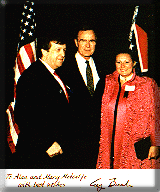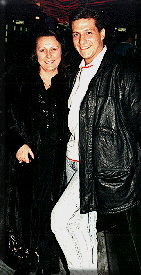|
"After our escape from Hungary we travelled to England on the same train as Shari Molnar who, with her four daughters, had also escaped the revolution and we became our good friends. Shari was the same age as my parents and Edith was my age. Joe Molnar had migrated to Tasmania, but his family had been prevented by the authorities from following him until their escape in 1956. As next of kin, Shari and her daughters joined their husband and father in Tasmania whilst we were still at Winslow. The Molnars knew Dad wanted to go to Australia and they attended to the migration procedures for us to join them in Tasmania. I will never forget Shari's love and generosity and she remains a great friend to this day. |
|
"We sailed to Melbourne on the Lloyd Triestino and l enjoyed my tenth birthday on board ship. At this time of arriving in a new country I decided that, with my Mother's name being Maria, I would be known as Mary, the English version, and have been known as Mary ever since.
Mr Molnar sponsored our small family to Tasmania and we were allowed thus to travel direct to Launceston. Dad worked very hard to improve his English and by hard study got a good job in his old profession with the Hydro-electric Commission. Mum also worked and within eighteen months they were able to put down a deposit on a home in Launceston. For us this was what the Lucky Country myth was all about. |
|
|
" I attended the Glenview State School and had the blessing of a wonderful teacher ". She insisted that my English be perfect and spent hours of her own time tutoring me after school.She was such a dedicated person and helped me to overcome the spelling problem which I had. Because Hungarian is a language all on its own with no derivatives it is a very hard language to change from. Dad, who had always loved water sports, taught me to swim and I became a very good swimmer in Tasmania. Other sports also appealed to me with the result that I was in the State netball team at the age of fifteen."
|
|
|
Laszlo Imre, who was her coach, had plans to make Mary a champion swimmer by relocating to the warmer climate of Queensland. In 196?; the Imres sold their home at Launceston and rented a home at Brisbane for two years. Mary attended the Kelvin Grove College where she completed her schooling. Ironically, she never became a champion swimmer in Queensland, which must have disappointed her father. A kindly taxi driver had taken the family on their arrival to a house that he knew was available for rent at Highgate Hill. Next-door staying with his sister was a seventeen-year-old lad who was working in a butcher's shop by day and studying meat and stock inspection at night. As Mary got to know Alan Metcalfe she found him to be a kindred spirit who felt as she did about life. Laszlo had been such a tremendous influence on Mary's thinking and philosophy that it was no small achievement for Alan to earn her confidence and affection. He was a free thinker like her father and they became great friends. Laszlo didn't find a suitable job in Brisbane. When he heard of the wages paid to skilled workers at Mount Isa Mine he went up and established himself there before bringing Maria and Mary up to a rented home. Mary didn't like the idea at all as she didn't want to leave Alan behind. She was depressed by the train journey through Townsville and felt they were going to the end of the world. Nine months later Mary's father invited Alan to have a holiday in Mount Isa with them. While he was there Alan was offered a job in a local butchery and relocated his work and study to there. At Christmas 1964 Mary and he were engaged in spite of Laszlo's opposition. He objected because Mary was only sixteen and Alan eighteen. Laszlo told Alan he could take his ring and get going! Mary had to have a deep and loving talk to him before calmer thoughts prevailed. "Dad and Alan became great friends and he told Alan that he could make more money at the mines. With his help Alan got a job sweeping the floors in the Electrical Engineering section.
|
|
|
Because Alan was quite a good footballer and well known he soon got a better job working underground and later a staff position in Underground Planning and Design." When Mary and Alan were married a year later Laszlo helped them build their home and swimming pool. Mary was seventeen and Alan nineteen. Maria had travelled back to Hungary, but Laszlo never wanted to look back and was not interested in returning to his earlier life. "My Father was a strong family man, a very spiritual man and true philosopher who had a tremendous influence on my young life. I have believed all through my life that God had a special plan for me if I just let Him walk through with me and just let things happen without interfering.
Because of my Father's influence I have felt I was a person of the world and never been afraid of the dark! Alan and I have the same spirit with no limitations and a spiritual relationship. |
|
|
"In 1967, after our son Clayton was born, Alan was asked to join AMP as a representative in Mount Isa. He left the Mine and was successful in reaching top sales figures in Australia for three consecutive years. Mount Isa was real pioneering country that brought out the best in Alan. But it is a hard life for women. The business success was tempered with sadness at the loss of two babies soon after birth. This sadness had a profound effect on our lives. I know it brought Alan back to earth and the realisation that no matter how much money you have it cannot take the place of the lives of your loved ones. During this time Alan resigned from the AMP and literally went bush. The demands of business got too much for him and I think he needed the solitude of the outback after losing two children.
Alan had learnt a lot at Mount Isa Mines and his father had been a prospector in North Queensland years before. Alan soon discovered the vast potential of the Mount Isa and Cloncurry mineral fields, and he established a good living producing copper ore for use as flux for the Mount Isa smelters. In 1970 Alan first saw the Hampden Mine at Kuridala south of Cloncurry, and from his experience at Mount Isa recognised its untapped potential." |
Mary and Clayton (1982) |
|
After the Metcalfes negotiated an agreement with the owner, they worked for five years against difficult world copper prices and negative government to develop the mine's potential. By 1972, when the Whitlam Government was elected, they had thirty people employed. They had planned for a school and hoped to be viable in a year. Then the new government pegged the price of copper and changed the tax laws, virtually overnight wiping out Alan and Mary and many small miners. "We had thousands of dollars of bills and commitments at the time and things looked very bleak for us. I didn't know where we'd turn to. But Alan dreamt up the idea of and started a free weekly newspaper in Mount Isa and together we worked the mine for two years. I learned to drive the bulldozers and trucks and how to prepare the explosives for the mine. It was a tough time and I prayed that we'd be delivered out of that predicament. In time we were able to clear our debts and think about a new direction in our lives. God has been very good to us and it wasn't long before our faith got us out of there and back on our feet again. |
Alan at Kuridala |
|
"Alan got involved in politics because he was frustrated by the way outback people were being treated by governments in Canberra and he wanted to do something about it. I don't think he realised how difficult that would be. After he joined the then Country Party he held leadership positions from the branch to Zone Vice-President. He worked with top party officials to form the North Australian Development Council and was elected its inaugural Chairman for four years. We made many friends in the party. Alan was convinced that a fairer tax system was essential to give people in the outback equality of opportunity. Although we travelled far and wide across Northern Australia we were unable to raise the support needed to hasten change.
In the 1974 election the National Party asked Alan to go to Tasmania for two months to organise their campaign there." In 1978 Mary and Alan moved to Townsville to live because there appeared to be work to do there in the Party organisation. Alan was continuing to he troubled by the neglect of the people of the north by various governments. Although he was warned that this was a difficult political area and the Nationals had very little support he became very involved in the Party organisation as Zone Vice-President, a member of State Management. |
|
|
"The Townsville newspapers never gave Alan a fair go. I think the socialists were afraid of what he might accomplish in government. To communicate our point of view to the northern public and also to earn a living we started our own newspaper. Alan suggested the women of the north needed their own paper and I found myself the proud publisher of 'Townsville Woman'! Later we went on to produce 14 films for international television release. Alan and I and our team took the National Party support in Townsville from seven to thirty per cent of the vote in two years. Twice Alan sought the Party's endorsement for the Senate and once he was narrowly beaten in the election for the seat of Townsville South.
To help Alan I became actively involved in the NP Women's Section and was, elected as Zone Vice-President for North Queensland. It was an interesting experience though I found the infighting a soul-destroying experience." |
Mary and Dianne Cilento |
|
In 1983 Mary and Alan moved to Brisbane to the more promising business and political opportunities offering there. Alan was endorsed as number four on the NP Senate ticket. The decision to move was somewhat provoked by the Federal Labor Government's undermining of the Metcalfes' business move into film production in the north. Their son, Clayton, was attending Nudgee College nearby. Mary and Alan sadly conceded that Australians, especially those in the north did not understand the threat of socialism as Mary had grown up to understand it, and that they did not have the time or financial support to further attempt to change this perception. |
|
|
"When we resigned our Party positions late that year we were flat broke and decided to return to full-time business. We were offered the worldwide rights to the ethanol technology developed at Queensland University by Dr Horst Doelle and, after extensive promotion, were instrumental in forming Queensland Science and Technology Limited. The shares rose to over five dollars under Alan's management before the crash in 1987, when we lost millions on our seven per cent of the shares. By 1988, even though Alan had worked selflessly for five years to get the Company established, we were again financially devastated."
|
 Alan and Dr. Doelle |
|
In 1984 Mary received the honour of representing the Women of Queensland at the tenth anniversary of the "Woman of the Year" luncheon in Canberra. Alan and her parents were very proud of her. Mary and Alan were invited to join the Australian Government Trade Delegation to Hungary in 1985. The little girl who had escaped through the mud in 1956 was given a warm welcome back, and her relatives were particularly impressed that she was part of an official delegation. Mary and Alan could see that the people in Hungary were ready for a change. They were sick of communism and desperately wanted to be freed from its grip. Everywhere the Metcalfes travelled the people were hungry for information about how they did business in Australia. "In 1985 my Father died from a massive heart attack after he'd been swimming on Sydney's Manly Beach. I was devastated. There were so many things that I should have discussed with him but for which I had never found the time, and I sensed that there were things he'd wanted to tell me. Time just ran out! We all loved him so much and respected his great courage and simple commitments. |
|
|
Mary's and Alan's work with presidential staff preparing the US Clean Air Act led to a meeting with President Bush in 1986 and an invitation to his inaugeration in 1988. Alan's work on selling the QSTL overseas opened the door to many similar meetings, especially in the United States where the technology was the most advanced available anywhere. In 1988 Alan resigned from QSTL and a week later he received a call from a friend in the US who invited him to advise on a $1 billion coal gasification project in Illinois. It was a refreshing change for them as they lived in a luxury apartment in Chicago for eighteen months. As Mary says, "God has been kind to us."
|
Meeting President Bush |
|
Mary and Alan's life took another turn at that time when Alan began writing his second book which expresses all that he tried to say in politics. Mary does the research for his books, and they now spend a major portion of their time in the USA. Their son, Clayton has joined the family company. With the help of friends around the world Alan and Mary have formed an international company called Harp International Business Exchange to market commmunications technology, especially between the United States, Australia, Europe and Russia. "We have lived a wonderful life, learned and seen so much. I hope Alan's new book and the Harp Exchange will help many people and bring about better relations between nations. As usual I will be at Alan's side speaking out when I have to and helping to make our contribution wherever we can. I will always be grateful to my Dad and Mum for bringing me to Australia as it has provided us with wonderful life and many opportunities. "Through the years I have never wanted any career but to support my family and I never wanted the spotlight. This has proved good for me as it has taken us all over the world and brought us into the company of many wonderful people. We have just gone where the spirit took us and never have we been daunted by hard times or criticism. In all this I have discovered that freedom is all about having your say and making your contribution. It is not something that anyone else can give you. |
Mary and Clayton (1990)
|
|
FOOTNOTE: Today Mary and Alan live in Brisbane, Australia where they are developing Alpha Info Business Servers, which is a development of the international communications network they began building in 1990. Mary is the director responsible for Customer Relations and Sales for HarpBBT and Alpha Info. |
|
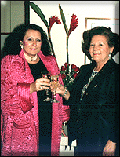
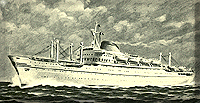
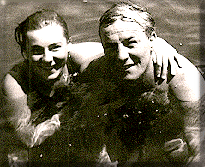
 Mary
the Swimmer
Mary
the Swimmer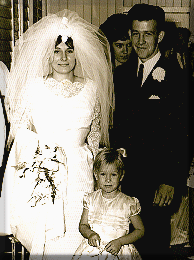 Mary
& Alan's Wedding
Mary
& Alan's Wedding 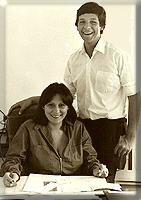
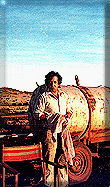
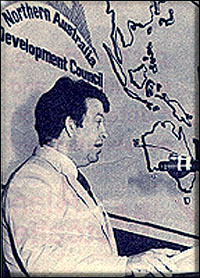 Alan
Chairing NAFC
Alan
Chairing NAFC 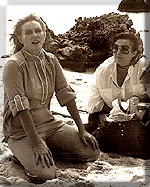
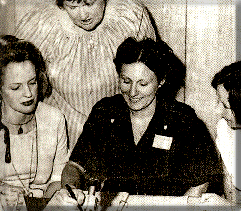 Mary's
Woman of the Year Team
Mary's
Woman of the Year Team 